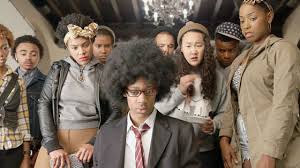MINORITY REPORT: Movie reviews of Dear White People, The Way He Looks and the “other” in movies
Posted: November 19, 2014 | Author: Donald | Filed under: Uncategorized | Tags: Brandon P. Bell, Daniel Ribiero, Dear White People, Dennis Haysbert, Fabio Audi, Ghilherme Lobo, Justin Simien, Kyle Gallner, Tess Amorim, Tessa Thompson, Teyonah Parris, The Way He Looks, Tyler James Williams | 3 Comments »First, a word from our sponsors. Ever wonder what a reader for a contest or agency thinks when he reads your screenplay? Check out my new e-book published on Amazon: Rantings and Ravings of a Screenplay Reader, including my series of essays, What I Learned Reading for Contests This Year, and my film reviews of 2013. Only $2.99. http://ow.ly/xN31r
Warning: SPOILERS
 Those who make films that appeal to niche markets in some way (by niche, I mean specific audiences of some sort: gay, black, Hispanic, female, etc.) have a good news/bad news issue in moviedom.
Those who make films that appeal to niche markets in some way (by niche, I mean specific audiences of some sort: gay, black, Hispanic, female, etc.) have a good news/bad news issue in moviedom.
The good news is that they have a preset group of people who are inherently more interested in seeing the movie because it is about them and their lives.
The bad news is that they have a preset group of people who are more inherently interested in seeing the movie because it is about them, but it is very difficult to convince anyone outside of that niche to buy tickets because they assume the movie can’t possibly have anything to say to them since it is about the “other” in their lives.
Which is why blockbuster movies often appeal to young straight white males, and many mainstream films that have a niche component, i.e. concerns in some way the other, either have a non-other central character (Cry Freedom, Glory) or if the central character is an other and can’t be gotten around, they surround him with non-other characters (Gandhi, 12 Years a Slave).
Of course, the irony here is that the movies that appeal to young straight white males (like Superman, Transformers, The Dark Knight Rises) are pure fantasy. They actually are as much the other for their target audience as any film with a minority lead. These blockbuster films have nothing to do with real life, or with the everyday existence of anyone in the audience, so they can’t possibly have anything to say to young straight white males…
Except perhaps that, as young straight white males, no matter what else is going on in the world, it emphasizes the idea that they still rule the roost.
 So I suppose the thinking is that if a majority (like young straight white males) are afraid of the other in life, then the other needs to be played by someone as close them as possible (Henry Cavill, Chris Hemsworth, Christian Bale—even when they are playing someone like Moses).
So I suppose the thinking is that if a majority (like young straight white males) are afraid of the other in life, then the other needs to be played by someone as close them as possible (Henry Cavill, Chris Hemsworth, Christian Bale—even when they are playing someone like Moses).
For those who are the other already (gay, black, Hispanic, female, etc.), their other (young straight white males) are such a part of their everyday life that they often don’t take that into consideration in choosing what film to see on date night. They already know that a movie can center around the other and still be about them.
At any rate, and after a long diversion here, there have been two films that have opened lately that have built in niche audiences. At the same time, both films are able to find the universal in the other.
 Evelyn Waugh’s book Decline and Fall is about a rather passive hero who gets caught up in a whirlwind of outrageous adventures. He never really causes anything to happen, things happen to him. He doesn’t even always react that much. And in the end, he finds his way back to where he began, no worse for the wear.
Evelyn Waugh’s book Decline and Fall is about a rather passive hero who gets caught up in a whirlwind of outrageous adventures. He never really causes anything to happen, things happen to him. He doesn’t even always react that much. And in the end, he finds his way back to where he began, no worse for the wear.
But along the way he constantly keeps running into a man who seems to be one of those unknown people who really runs the world, who is really the maker and shaker of events. No one knows who he really is because he doesn’t want that—if he was known, he wouldn’t have the power he does.
At one point, he relates a metaphor to our hapless hero. He says the world is like a merry-go-round on a child’s playground, one that both spins and goes up and down. He says that there are only two places one can stand in regards to the spinning and have no trouble remaining straight up and keeping one’s balance: either one has to be in the very center of the ride or not be on the merry-go-round at all.
The man is someone who is in the very center and, therefore, has no trouble standing up. The hero of the book had never gotten on in the first place and therefore has no trouble as well.
But the man says that the real lesson here is that the vast majority of the world are on the merry-go-round trying desperately to get to the center so they can stand up. But most of them, if any, will never get there.
And that’s just the way the world turns.
I thought of this as I was watching Dear White People, the new satire of race relations and higher education that takes place at Winchester University, a fictional Midwest Ivy League college that is primarily white, but has a large black enrollment.
Welcome to Winchester, an academic institution where the white students claim that America is post racial since a black man is president, but still want to and are able to assert their racial privilege.
Yes, welcome to Winchester, a hallowed school where all the black students do is engage in racial politics, whether they want to or not.
And welcome to Winchester University, a place of higher learning where the only thing worse than being black is being gay and the only thing worse than being gay is being black and gay.
So welcome to Winchester University where everybody, no matter their race, creed, gender or sexual orientation, student or teacher, Dean or Vice President, does nothing but try desperately to reach the center of the merry-go-round so they can stand up without any problem.
And because of this, there are times when you become so frustrated at the way the characters are acting on screen that you just want to shout at them to just stop and, well, jump off the damn thing, you’ll never make it to where you want to go.
But do any of us ever listen, even to ourselves? As was said, this is just the way the world turns.
Dear White People is a first feature from Justin Simien, a story that is not so pretty, but is more than quite witty, and yes, also gay. It’s a debut that shows talent and promise for a fruitful future if he can avoid being hired by the studios.
Satire may be the dominant style here, but Simien still manages to find the humanity in it all as well. Maybe everything is tinged by race and gender politics, but it’s also about the universal themes of the impossibility of pleasing a too demanding father; not being able to find a group to fit in with; the need to find one’s own voice in creating art; the need to be one’s self, and not have one’s looks, fashion and political views dictated by everyone else.
But in the end, no matter how universal the issues may be, it’s still race and gender that drive what everyone does.
It starts with tension over whether to eliminate black only housing and continues with a series of conflicts that culminates in a party (a scene that perhaps could have used a bit more from the directing half of Simien, it doesn’t seem mined as much as it could have been for dramatic effect) that was supposed to be a Halloween event with a retro hip-hop theme but turns into a gathering where everyone shows up in their most insensitive get-ups (complete with watermelon hors d’oeuvres and Mountain Dew chasers), a climax inspired by a few too many real life counterparts (as we are made privy to in the credits).
The result is the best observation of the film: there is some mystery as to just who exactly sent the racially tinged e-vite for the party. Was it the white son of the Dean or a female, black aspiring filmmaker? The suggestion is that it is the filmmaker, but as she says: it doesn’t really matter who sent it; all that matters is that people didn’t react in outrage, but took it seriously and showed up in their Sunday go to meeting racist best.
In the end, some of the characters seem to finally jump off the merry-go-round, including the aspiring filmmaker who also hosts a radio show that makes fun of white attitudes toward blacks, and is the source of the movie’s title, and a gay aspiring writer who keeps getting sent from housing to housing because no one wants him around (you can tell that both have learned something by their change in hair styles—the filmmaker lets her luxurious locks cascade down to her shoulders and the writer gives a buzz cut to his rather large afro).
Others continue struggling to stand up, including the son of the Vice President (a father who takes out on his son his bitterness at being more qualified to be Dean, but has to play second fiddle to a former classmate who was given the position over him because he was white) and the son of the Dean, who tries to maintain his privilege by claiming that racism no longer exists.
In the end, Dear White People is post racist, but not in the sense that racism doesn’t exist, but in its finding a way to explore what it’s like to be black, female and gay in a world where the whites have had no choice but to give minorities more opportunity, but will still do anything to maintain their seat of power, even if it’s to lie about racism in America.
With Tyler James Williams, the Chris that everyone hates, as Lionel, the writer who’s gay; Tessa Thompson as the filmmaker with the doubly ironic name Sam White (she’s female and black); Brandon P. Bell as Troy, the son of the Vice President (didn’t that city-state lose the war?); Teyonah Parris (the first black secretary at the ad agency in Mad Men) as ‘Coco’, a princess who identifies more with the values of the white majority than the politics of the black minority; and Kyle Gallner (“Beaver” of Veronica Mars) as Kurt Fletcher, the son of the Dean.
With Dennis Haysbert as the Vice President, hopefully having fun at playing a not so nice guy rather than be the POTUS with the mostus or sell insurance.
 The Way He Looks, the title of the new Brazilian coming of age drama from writer/director Daniel Ribiero, is both ironic and has a double meaning.
The Way He Looks, the title of the new Brazilian coming of age drama from writer/director Daniel Ribiero, is both ironic and has a double meaning.
It’s ironic because the central character, high school teen Leonardo, is blind and can’t exactly look.
It has a double meaning because it also refers to both Leonardo and a new boy in town Gabriel because of the way they look to each other.
Like Dear White People, though the subject matter of the story is about a minority group, here gay teens as well as the visually impaired, much of the conflict revolves around the usual stuff of growing up: trying to become independent of one’s parents; finding true love; having to redefine friendships; exploring sex for the first time.
But like Dear White People, as universal as The Way He Looks may be, and though it finds the universal in the specific, the story is still driven by the minority status of the central character.
The Way He Looks is a charming and sweet. Ribiero has done a strong job of exploring the universal emotions and conflict at the heart of the film as well as the specific ones of belonging to a group within a group.
As the story develops, the various farcical misunderstandings that impede the two characters from getting together may wear a bit thin, but in the end, everything works out in life affirming and not too saccharin ways.
With Ghilherme Lobo as Leonardo; Fabio Audi as Gabriel; and Tess Amorim as Giovani, Leonardo’s best friend, female, who finds it more and more difficult to fit in as Leonardo and Gabriel grow closer.
Brazil’s entry in the 2014 foreign language film category for the Academy Awards.












… [Trackback]
[…] Here you will find 4028 more Information on that Topic: rumblespoon.com/wp/2014/minority-report-movie-reviews-of-dear-white-people-the-way-he-looks-and-the-other-in-movies/ […]
Wow, superb blog layout! How lengthy have you ever been blogging for?
you make blogging look easy. The total look of your
website is excellent, let alone the content material!
You can see similar: ecommerce and here sklep online
It’s actually a cool and helpful piece of information. I’m happy that you shared this useful information with us.
Please keep us up to date like this. Thank you for sharing.
I saw similar here: sklep internetowy and also here:
sklep online